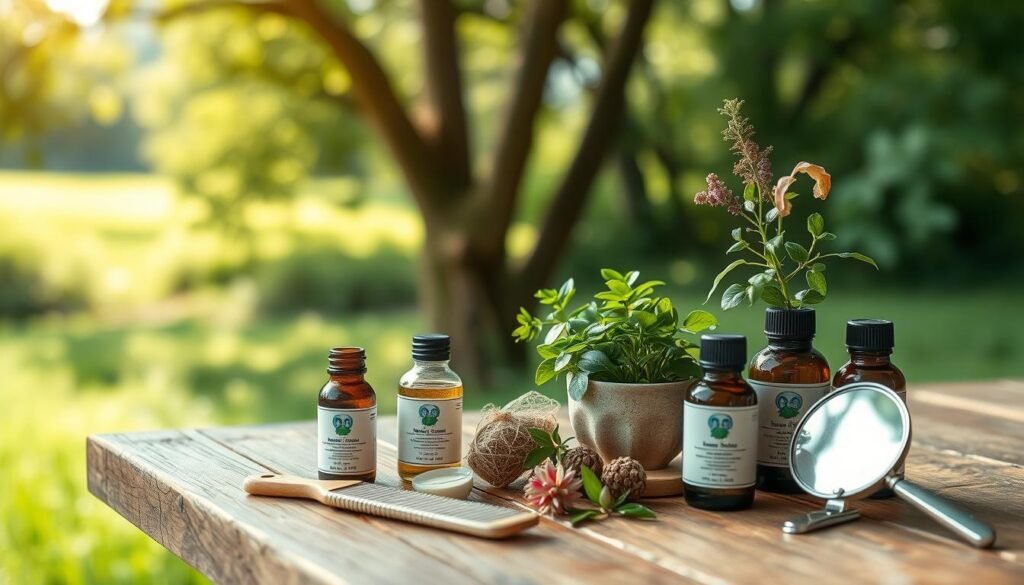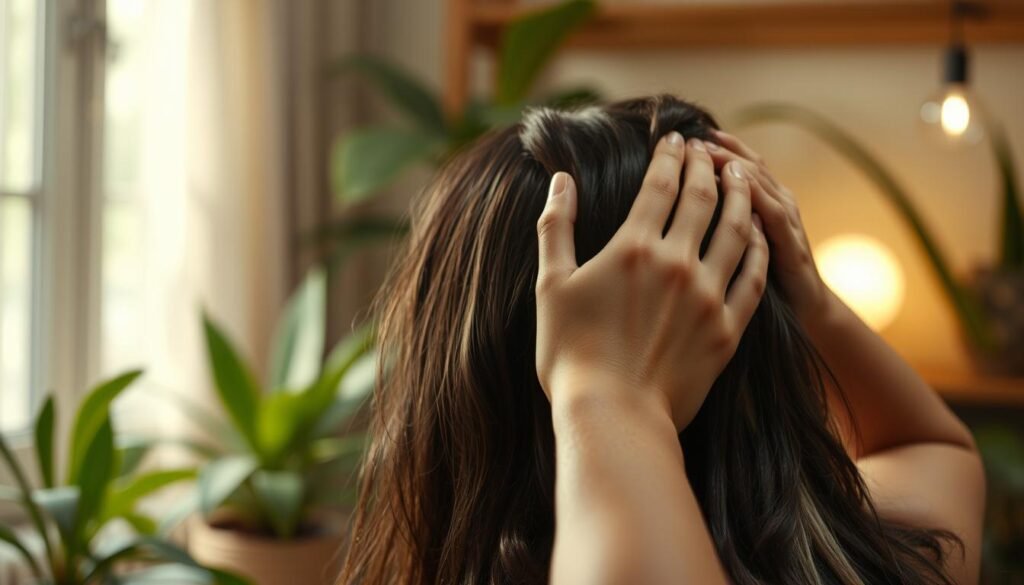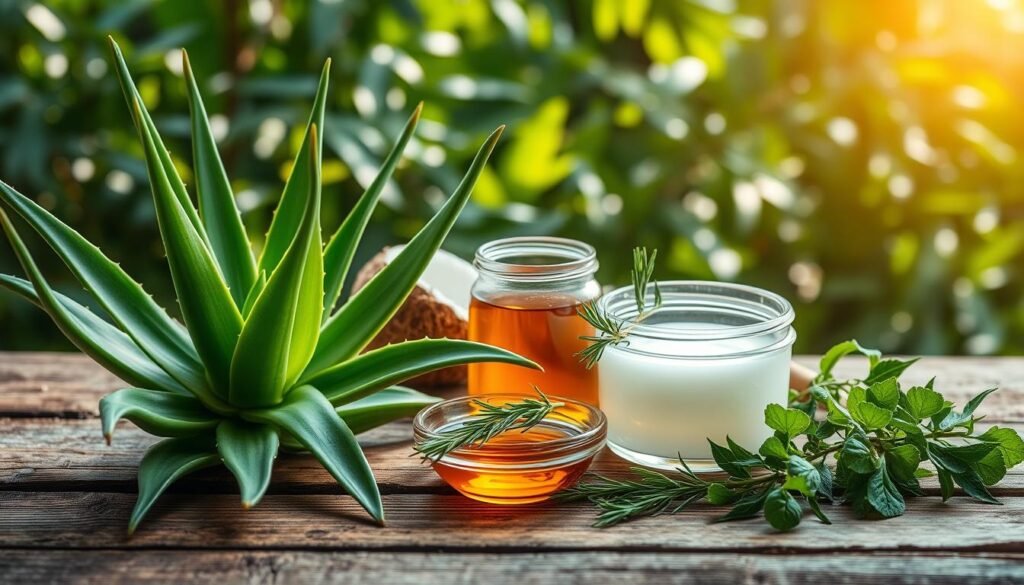How to Prevent Hair Fall? | Stop Hair Loss Naturally
Did you know that over 80% of men and 50% of women will experience significant hair loss by the age of 50? This staggering statistic underscores the widespread prevalence of hair loss and the growing demand for effective remedies to restore healthy hair growth. In this comprehensive Guide, we’ll explore the best natural and medical treatments to combat hair thinning and promote lush, vibrant locks.
Whether you’re struggling with genetic, hormonal, or stress-induced Hair Loss, there are various proven remedies that can help stimulate new hair follicles and prevent further shedding. From nourishing your scalp with essential oils to incorporating targeted supplements into your diet, we’ll delve into the most promising solutions to regain your confidence and reclaim your full, healthy head of hair.
Key Takeaways
- Learn about the common causes of Hair Loss and their impact on hair health
- Discover the essential vitamins, minerals, and nutrients that support hair regrowth
- Explore natural remedies, including essential oils and herbal treatments, for hair restoration
- Understand the role of medical treatments, such as over-the-counter options and prescription medications
- Discover how scalp health and lifestyle factors influence hair growth
Understanding Hair Loss: Causes and Effects
Hair loss can be a distressing and complex issue, often stemming from a combination of genetic, hormonal, and environmental factors. To better understand this common concern, let’s explore the most prevalent causes of hair loss and the impact that stress can have on hair health.
Common Causes of Hair Loss
Hair loss, also known as Alopecia, can be attributed to a variety of factors, including:
- Genetic predisposition: Certain individuals are genetically more prone to experiencing hair loss, often leading to a receding hairline or thinning hair over time.
- Hormonal imbalances: Changes in hormone levels, such as those experienced during pregnancy, menopause, or due to certain medical conditions, can contribute to hair loss.
- Certain medications: Some prescription drugs, including those used for cancer treatment, depression, and high blood pressure, can have hair loss as a side effect.
- Nutritional deficiencies: A lack of essential vitamins, minerals, and proteins in the diet can impair hair growth and lead to thinning or shedding.
- Underlying medical conditions: Conditions like thyroid disorders, anemia, and autoimmune diseases can also trigger excessive hair loss.
The Impact of Stress on Hair Health
Stress plays a significant role in hair health, as it can disrupt the normal hair growth cycle. High levels of stress can lead to a condition called telogen effluvium, where a large number of hair follicles enter the resting (telogen) phase prematurely, resulting in increased shedding and thinning of the hair.
Stress can also exacerbate other hair loss conditions, such as androgenetic Alopecia (male- or female-pattern baldness) and alopecia areata, an autoimmune disorder that causes patchy hair loss. Managing stress through techniques like meditation, yoga, or counseling can help mitigate the negative effects on hair health.

By Understanding the underlying causes of hair loss and the impact of stress, individuals can take proactive steps to address the issue and explore the best remedies for hair regrowth.
Nutritional Factors for healthy Hair
Maintaining luscious, healthy hair is not just about external hair care routines – it’s also heavily influenced by the nutrition you provide your body. Certain vitamins, minerals, and nutrients play a crucial role in promoting hair regrowth and preventing further hair loss. By understanding the key elements for hair growth, you can nourish your hair from the inside out.
Key Vitamins and Minerals for Hair Growth
Among the essential vitamins and minerals for hair health, biotin and iron stand out as superstars. Biotin, also known as vitamin B7, helps strengthen hair and stimulate new growth. Iron, on the other hand, ensures that your hair follicles receive adequate oxygen and nutrients, supporting the growth cycle.
Other important nutrients include:
- Vitamin C – Aids in collagen production, which is essential for healthy hair.
- Zinc – Supports the oil glands around the hair follicles, preventing dryness and brittleness.
- Vitamin E – Acts as an antioxidant, protecting hair from damage and promoting growth.
Foods That Promote Hair Regrowth
Fortunately, many natural hair regrowth remedies can be found in the foods we eat. Some of the best options for promoting hair growth include:
- Eggs – Rich in biotin and protein, which are crucial for hair health.
- Spinach – High in iron, vitamin C, and other nutrients that support hair growth.
- Nuts and seeds – Provide a variety of hair-friendly vitamins and minerals, such as zinc and omega-3 fatty acids.
- Salmon – Contains omega-3 fatty acids and vitamin D, which help reduce inflammation and nourish the scalp.
- Sweet potatoes – Packed with vitamin A, which stimulates the production of sebum, the natural oil that keeps hair healthy.
By incorporating these nutrient-rich foods into your diet, you can provide your hair with the essential building blocks it needs to thrive and regrow, naturally.

“The key to healthy, vibrant hair is nourishing it from within. Embrace the power of a nutrient-dense diet to support your hair’s natural growth and vitality.”
Natural Remedies for Hair Regrowth
If you’re seeking a natural approach to combat hair loss and promote regrowth, there are several promising remedies to consider. From the rejuvenating power of essential oils to the nourishing benefits of herbal treatments, these natural solutions can help revitalize your locks and restore your hair’s vitality.
Essential Oils for Hair Restoration
Essential oils have long been revered for their ability to nourish and stimulate the scalp, leading to healthier hair growth. Two standout options are rosemary oil and peppermint oil. Rosemary oil has been shown to improve blood circulation, which can aid in hair regrowth, while peppermint oil’s menthol properties can invigorate the scalp and promote follicle activity.
Herbal Treatments to Consider
- Saw Palmetto: This herb has been found to inhibit the production of DHT, a hormone that can contribute to hair loss, making it a potential natural hair regrowth oils solution.
- Ginseng: Ginseng is rich in antioxidants and has been studied for its ability to stimulate hair follicles and encourage natural hair growth remedies.
- Biotin: Also known as vitamin B7, biotin is essential for the health of hair, skin, and nails, and can help support healthy hair growth.
When incorporating these natural remedies into your hair care routine, be patient and consistent. It may take some time to see the full benefits, but with a diligent approach, you can unlock the power of nature to revive your hair and reclaim your confidence.

Medical Treatments for Hair Loss
For individuals struggling with hair loss, medical treatments can offer a glimmer of hope. From over-the-counter options to prescription medications, these solutions aim to stimulate hair regrowth and combat the underlying causes of hair loss.
Over-the-Counter Options
One of the most well-known and widely available hair loss treatments is minoxidil, commonly known by the brand name Rogaine. Minoxidil is an FDA-approved over-the-counter medication that can be effective in promoting hair regrowth, especially when used consistently. It works by increasing blood flow to the scalp and stimulating the growth of new hair follicles.
Prescription Medications and Their Efficacy
While over-the-counter treatments can be a good starting point, some individuals may require more potent prescription medications to address their hair loss. One of the most commonly prescribed drugs is finasteride, which works by inhibiting the production of the hormone dihydrotestosterone (DHT), a leading cause of male pattern baldness. Studies have shown that finasteride can be effective in slowing down hair loss and even promoting regrowth in some cases.
Another prescription option is the oral medication spironolactone, which is primarily used to Treat high blood pressure but can also be beneficial for women experiencing hair loss. Spironolactone works by blocking the effects of androgen hormones that can contribute to thinning hair.
It’s important to note that the effectiveness of these medical treatments can vary from person to person, and they may come with potential side effects. Consulting with a dermatologist or hair specialist is crucial to determine the most suitable treatment plan based on the individual’s specific condition and needs.

The Role of Scalp Health in Hair Growth
Maintaining a healthy scalp is crucial for promoting optimal hair growth. Proper scalp care can help address common hair loss issues and stimulate the follicles to encourage new hair development. Let’s explore the importance of regular scalp cleansing and the benefits of scalp massages for hair regrowth.
Importance of Regular Scalp Cleansing
The scalp is the foundation for healthy hair, and it requires attentive care to ensure proper nourishment and circulation. Regular cleansing helps remove buildup of sebum, dead skin cells, and environmental pollutants that can clog follicles and impede hair growth. By keeping the scalp clean and free of excess debris, you can create an ideal environment for robust hair development.
Scalp Massages: Benefits and Techniques
Scalp massages are a natural and effective way to stimulate hair growth. The gentle manipulation of the scalp increases blood flow to the follicles, delivering vital nutrients and oxygen to support healthy hair development. Additionally, scalp massages can help relieve stress and tension, which are common contributors to scalp massages for hair growth and What are the best remedies for hair regrowth?
- Use your fingertips to apply gentle, circular motions across the entire scalp.
- Focus on areas with thinning or patchy hair growth, applying slightly more pressure to those regions.
- Perform scalp massages for 5-10 minutes, 2-3 times per week, to maximize the benefits.

By incorporating regular scalp cleansing and massages into your hair care routine, you can create an optimal environment for scalp massages for hair growth and What are the best remedies for hair regrowth?
| Scalp Cleansing Techniques | Scalp Massage Benefits |
|---|---|
| – Use a gentle, sulfate-free shampoo – Massage the scalp with your fingertips – Rinse thoroughly to remove all product residue |
– Increased blood flow to follicles – Reduced stress and tension – Stimulation of new hair growth – Improved overall scalp health |
Lifestyle Changes to Support Hair Regrowth
When it comes to natural hair growth remedies, incorporating lifestyle changes can have a significant impact on the health and resilience of your hair. From exercise to proper sleep, these everyday habits can play a crucial role in stimulating hair regrowth and preventing future hair loss.
Exercise and Its Effects on Hair Health
Regular physical activity not only benefits your overall well-being but also promotes healthy hair growth. Exercise improves blood circulation, which delivers essential nutrients and oxygen to the scalp and hair follicles. This enhanced circulation can help nourish the roots and stimulate new hair growth.
Engaging in a variety of exercises, such as cardiovascular workouts, strength training, and yoga, can contribute to the natural hair growth remedies you can incorporate into your lifestyle. By increasing blood flow and reducing stress, exercise can be a powerful tool in your quest for thicker, stronger hair.
The Importance of Sleep for Hair Restoration
Adequate and quality sleep is often overlooked, but it is a vital component of what are the best remedies for hair regrowth. During sleep, the body enters a restorative state, and this is when important cellular processes, including hair growth, take place.
- Aim for 7-9 hours of sleep each night to support your body’s natural hair restoration processes.
- Establish a consistent sleep routine to regulate your body’s circadian rhythms and promote better sleep quality.
- Avoid screen time and stimulating activities close to bedtime, as they can disrupt sleep and impair hair health.
By making lifestyle changes that prioritize exercise and quality sleep, you can take a proactive approach to supporting your hair’s natural growth and vitality. Incorporating these practices into your routine can be a powerful component of your natural hair growth remedies arsenal.

Home Remedies for Thinning Hair
If you’re struggling with thinning hair, you’ll be glad to know that there are effective home remedies you can try to promote natural hair growth. From DIY hair masks to simple scalp treatments, these natural solutions can help revitalize your locks and combat the signs of hair loss.
DIY Hair Masks for Hair Regrowth
One of the best ways to nourish your hair and encourage regrowth is through the use of homemade hair masks. Here are a few recipes to consider:
- Egg Mask: Whisk together two eggs and apply the mixture to your scalp and hair. Let it sit for 20 minutes before rinsing.
- Avocado Mask: Mash up a ripe avocado and mix it with a tablespoon of honey. Massage the mixture into your scalp and hair, then rinse after 30 minutes.
- Coconut Oil Mask: Warm up some organic coconut oil and apply it to your scalp and hair. Cover with a shower cap and let it penetrate for an hour before washing.
Simple Scalp Treatments for Hair Regrowth
In addition to DIY hair masks, you can also try these easy scalp treatments to promote natural hair growth remedies and hair regrowth oils:
- Perform a gentle scalp massage using your fingertips to stimulate blood flow and nourish the hair follicles.
- Mix a few drops of rosemary or peppermint essential oil with a carrier oil like jojoba or almond oil, and massage it into your scalp.
- Create a baking soda paste by mixing baking soda and water, then gently scrub it onto your scalp to exfoliate and remove buildup.
Remember, consistency is key when it comes to these home remedies. Incorporate them into your regular hair care routine for the best results.

Advanced Hair Restoration Techniques
When it comes to treating hair loss, sometimes traditional methods may not be enough. Fortunately, advanced hair restoration techniques have emerged as effective solutions for those seeking to regain a full, healthy head of hair. In this section, we’ll explore two of the most promising approaches: Platelet-Rich Plasma (PRP) Therapy and Hair Transplant Surgery.
Platelet-Rich Plasma (PRP) Therapy
PRP therapy is a revolutionary treatment that utilizes the power of your own blood to stimulate hair growth. By extracting a small sample of your blood and separating the nutrient-rich platelets, we can then re-inject this concentrated solution directly into the scalp. The high concentration of growth factors and proteins found in PRP can help activate dormant follicles, leading to improved hair density and thickness over time.
Unlike some other hair loss treatments, PRP is a non-surgical, minimally invasive procedure that typically requires multiple sessions for optimal results. Many patients report seeing a noticeable difference in the quality and volume of their hair within a few months of starting PRP therapy.
Hair Transplant Surgery Explained
For those experiencing significant, persistent hair loss, hair transplant surgery may be a viable option. This procedure involves carefully harvesting healthy, active hair follicles from areas of the scalp with abundant growth and transplanting them to the thinning or Balding regions. The transplanted follicles then take root and begin to grow new hair, providing a natural-looking and long-lasting solution to hair loss.
While hair transplant surgery is more invasive than PRP therapy, the results can be truly transformative. With advancements in surgical techniques, hair transplants have become increasingly precise and natural-looking, allowing patients to restore their confidence and achieve the full, vibrant head of hair they desire.

Whether you opt for PRP therapy or hair transplant surgery, it’s important to work closely with a qualified hair restoration specialist to determine the best course of action for your unique hair care needs. With the right approach, you can take control of your hair loss and enjoy a fuller, healthier head of hair.
The Impact of Hair Care Products on Regrowth
When it comes to hair regrowth, the products you use can make a significant difference. Choosing the right shampoo and conditioner, as well as being mindful of the ingredients, can greatly impact the health and vitality of your hair. Let’s explore how to select hair care products that support hair regrowth and avoid potential pitfalls.
Choosing the Right Shampoo and Conditioner
Selecting the appropriate hair regrowth shampoos and conditioners is crucial for promoting healthy hair growth. Look for products that contain nourishing ingredients like biotin, vitamins, and minerals. These essential nutrients can help strengthen the hair follicles and stimulate new growth. Avoid harsh sulfates, parabens, and silicones, as they can strip the hair of its natural oils and potentially hinder regrowth.
Ingredients to Avoid for Healthy Hair
- Sulfates: These detergents can be drying and irritate the scalp, leading to further hair loss.
- Parabens: Commonly used as preservatives, parabens have been linked to hormone disruption and can negatively impact hair health.
- Silicones: While they may provide a temporary shine, silicones can build up on the hair and scalp, preventing proper moisture and nutrient absorption.
- Alcohol: Excessive use of products containing alcohol can dry out the hair and scalp, contributing to dryness and brittleness.
By carefully selecting hair regrowth serums and other hair care products that are free from these potentially harmful ingredients, you can help create an environment conducive to healthy hair growth and regrowth.

“Healthy hair starts with a healthy scalp. Nourishing your scalp with the right products is the key to achieving the lush, vibrant hair you desire.”
Incorporating hair regrowth-friendly products into your daily routine can be a game-changer in your journey towards thicker, stronger, and more resilient hair. By making mindful choices, you can support your hair’s natural growth cycle and unlock its full potential.
Psychological Effects of Hair Loss
Experiencing hair loss can have a profound impact on an individual’s mental health and emotional well-being. The psychological effects of hair loss are often overlooked, but they can be significant and far-reaching. As individuals navigate the challenges of hair loss treatments and remedies for hair regrowth, it’s crucial to address the emotional toll and seek professional support when needed.
Coping with Hair Loss: Mental Health Matters
Hair loss can trigger a range of emotions, from feelings of low self-esteem and anxiety to depression and social withdrawal. The loss of hair, which is often closely tied to one’s sense of identity and physical appearance, can be a difficult experience to process. Individuals may struggle with the perception of others and feel self-conscious or embarrassed about their changing appearance.
It’s important to acknowledge these emotional responses and find healthy coping mechanisms. Stress management techniques, such as meditation, yoga, or counseling, can be beneficial in managing the stress and anxiety associated with hair loss. Additionally, building a strong support network and engaging in activities that promote self-confidence can help individuals navigate this challenging time.
Seeking Professional Support
For some, the psychological impact of hair loss may be more severe, and seeking professional support can be a crucial step in the recovery process. Mental health professionals, such as therapists or counselors, can provide valuable guidance and tools to help individuals cope with the emotional turmoil and regain a sense of control over their lives.
“Hair loss can be a profoundly distressing experience, but it’s essential to remember that you’re not alone. With the right support and strategies, it’s possible to overcome the psychological challenges and focus on your overall well-being.”
By addressing the emotional aspects of hair loss treatments and remedies for hair regrowth, individuals can take a holistic approach to their hair health journey and improve their overall quality of life.

Preventative Measures Against Future Hair Loss
Staying proactive about your hair health is key to preventing future hair loss. By understanding the early signs of thinning and implementing best practices for daily hair care, you can take control of your natural hair growth and minimize the risk of experiencing significant shedding down the line.
Early Signs of Hair Thinning to Watch For
While some hair loss is normal, paying attention to the following warning signs can help you identify potential issues early on:
- Increased hair shedding when brushing, washing, or styling
- Noticeable widening of the part line or receding hairline
- Smaller ponytail or bun size compared to the past
- More visible scalp through your hair
- Excessive hair left behind on your pillow or in the shower drain
Best Practices for Daily Hair Care
Incorporating these hair-healthy habits into your daily routine can go a long way in preventing future natural hair growth remedies and promoting What are the best remedies for hair regrowth?:
- Use a gentle, sulfate-free shampoo and conditioner formulated for your hair type
- Limit heat styling tools and products that can damage the hair and scalp
- Massage your scalp regularly to stimulate blood flow and nourish follicles
- Protect your hair from sun exposure, which can dry it out and accelerate shedding
- Eat a balanced diet rich in vitamins and minerals that support hair growth
- Stay hydrated and get enough quality sleep to support overall hair health
By staying vigilant and adopting these preventative measures, you can take proactive steps to maintain healthy, strong, and vibrant hair for years to come.

When to Seek Professional Help for Hair Loss
While self-care and natural remedies can be effective in addressing mild to moderate hair loss, there may come a time when professional intervention is necessary. Recognizing the signs that it’s time to consult a dermatologist can make a significant difference in your hair regrowth journey.
Signs It’s Time to Consult a Dermatologist
If you’ve tried various hair loss treatments without success, or if your hair loss is accompanied by other concerning symptoms, it’s advisable to seek the expertise of a dermatologist. Some key indicators that a professional consultation is warranted include: persistent, excessive shedding, noticeable thinning or Balding patches, changes in hair texture or growth patterns, and any underlying medical conditions that may be contributing to your hair loss.
Questions to Ask Your Hair Specialist
When meeting with a dermatologist or hair specialist, it’s important to come prepared with a list of questions to ensure you receive the most comprehensive care. Some essential questions to ask include: What is the underlying cause of my hair loss? What treatment options are available, and what are the potential side effects? How long before I can expect to see results? What lifestyle and dietary changes can I make to support healthy hair growth? By proactively addressing your hair loss concerns with a professional, you can develop a personalized plan to regain the full, vibrant head of hair you desire.
FAQ
What are the most effective remedies for hair regrowth?
There are several effective remedies for hair regrowth, including natural hair growth remedies, hair loss treatments, and targeted supplements. Some of the best options include essential oils, herbal treatments, scalp massages, and over-the-counter medications like minoxidil.
What are the common causes of hair loss?
Hair loss can be caused by a variety of factors, including genetic predisposition, hormonal imbalances, stress, nutritional deficiencies, and certain medical conditions. Understanding the underlying cause is crucial for developing an effective treatment plan.
Which vitamins and minerals are important for healthy hair growth?
Key nutrients that support hair regrowth include biotin, iron, zinc, vitamin C, and omega-3 fatty acids. Incorporating these essential vitamins and minerals through a balanced diet or targeted supplements can help promote natural hair growth.
What are some natural remedies for hair regrowth?
Natural remedies for hair regrowth often include the use of essential oils, such as rosemary and peppermint, as well as herbal treatments like saw palmetto and ginseng. These natural solutions can help stimulate the scalp and nourish hair follicles.
How can medication and medical treatments help with hair loss?
Over-the-counter options like minoxidil can be effective in promoting hair regrowth, while prescription medications like finasteride can address the underlying causes of hair loss. More advanced treatments, such as PRP therapy and hair transplant surgery, are also available for those with severe or persistent hair loss.
Why is scalp health important for hair growth?
Maintaining a healthy scalp is crucial for optimal hair growth. Regular scalp cleansing and massages can help improve circulation, unclog follicles, and create an environment conducive to hair regrowth.
How can lifestyle changes support hair regrowth?
Factors like exercise, stress management, and quality sleep can all have a significant impact on hair health. Incorporating these lifestyle changes can help support the body’s natural hair restoration processes.
What are some effective home remedies for thinning hair?
DIY hair masks and scalp treatments using ingredients like eggs, avocado, and coconut oil can be beneficial for thinning hair. These natural solutions can help nourish the scalp and promote hair regrowth.
When should someone seek professional help for hair loss?
If you notice significant or persistent hair thinning, it’s advisable to consult a dermatologist or hair specialist. They can help identify the underlying cause and recommend the most appropriate treatment plan for your specific needs.






